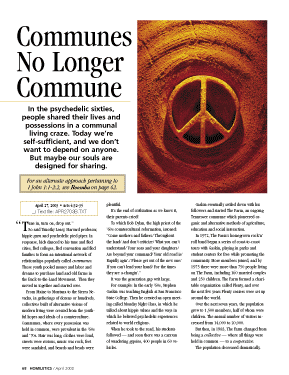
Communes No Longer Commune
| Acts 4:32-35
The ‘60s are fading fast, and so are communes to which so many of the ‘60s dropouts fled in a post-Bohemian search for meaning. Today, we’re much more independent or self-sufficient. Or are we? Perhaps our souls were made for sharing.
"Tune in, turn on, drop out.”
So said Timothy Leary, Harvard professor, hippie guru and psychedelic pied piper. In response, kids danced to his tune and fled cities, fled colleges, fled convention and fled families to form an intentional network of relationships popularly called communes. Those youth pooled money and labor and dreams to purchase land and old farms in the Back-to-the-Land Movement. Then they moved in together and started over.
From Maine to Montana to the Sierra Nevadas, in gatherings of dozens or hundreds, collectives built of alternative visions of modern living were created from the youthful hopes and ideals of a counterculture. Communes, where every possession was held in common, were prevalent in the ’60s and ’70s. Hair was long, clothes were loud, streets were riotous, music was rock, feet were sandaled, and beards and beads were plentiful.
It’s the end of civilization as we know it, their parents cried!
To which Bob Dylan, the high priest of the ’60s...
Start today. Cancel any time.
Act now and, for just $7.99 a month or $69.95 a year, you’ll receive a full year of this valuable sermon preparation resource.
Our convenient, continuous-subscription program ensures you'll never miss out on the inspiration you need, when you need it.
You’re never obligated to continue. Naturally, you may cancel at any time for any reason, no questions asked.